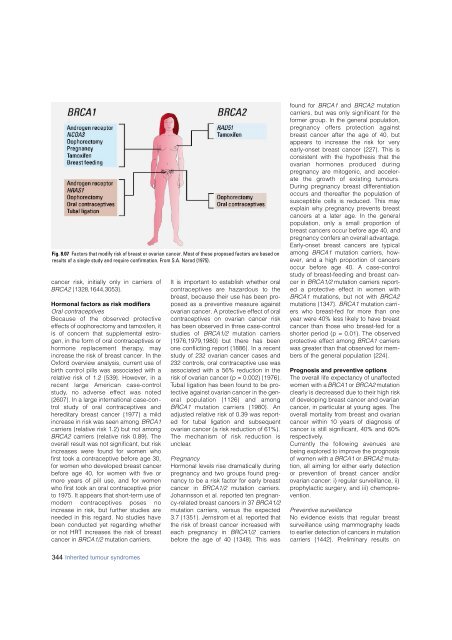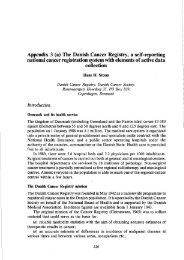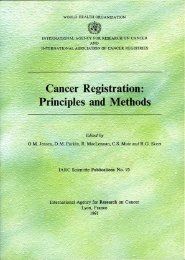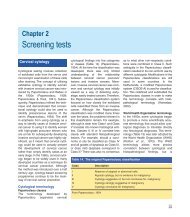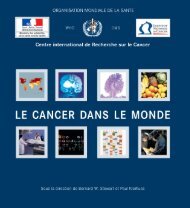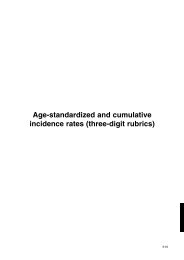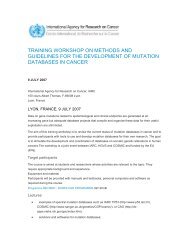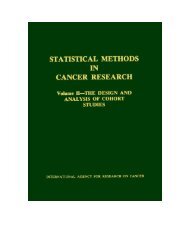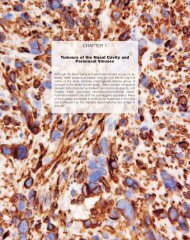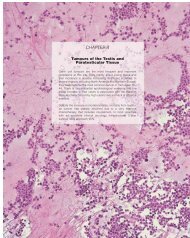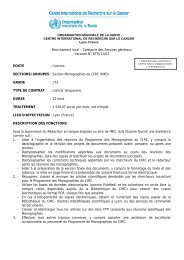Invasive breast carcinoma - IARC
Invasive breast carcinoma - IARC
Invasive breast carcinoma - IARC
Create successful ePaper yourself
Turn your PDF publications into a flip-book with our unique Google optimized e-Paper software.
Fig. 8.07 Factors that modify risk of <strong>breast</strong> or ovarian cancer. Most of these proposed factors are based on<br />
results of a single study and require confirmation. From S.A. Narod {1975}.<br />
cancer risk, initially only in carriers of<br />
BRCA2 {1328,1644,3053}.<br />
Hormonal factors as risk modifiers<br />
Oral contraceptives<br />
Because of the observed pro t e c t i v e<br />
effects of oophorectomy and tamoxifen, it<br />
is of concern that supplemental estrogen,<br />
in the form of oral contraceptives or<br />
h o rmone replacement therapy, may<br />
increase the risk of <strong>breast</strong> cancer. In the<br />
Oxford overview analysis, current use of<br />
birth control pills was associated with a<br />
relative risk of 1.2 {539}. However, in a<br />
recent large American case-contro l<br />
s t u d y, no adverse effect was noted<br />
{2607}. In a large international case-cont<br />
rol study of oral contraceptives and<br />
hereditary <strong>breast</strong> cancer {1977} a mild<br />
increase in risk was seen among BRCA1<br />
carriers (relative risk 1.2) but not among<br />
BRCA2 carriers (relative risk 0.89). The<br />
overall result was not significant, but risk<br />
increases were found for women who<br />
first took a contraceptive before age 30,<br />
for women who developed <strong>breast</strong> cancer<br />
before age 40, for women with five or<br />
more years of pill use, and for women<br />
who first took an oral contraceptive prior<br />
to 1975. It appears that short-term use of<br />
m o d e rn contraceptives poses no<br />
increase in risk, but further studies are<br />
needed in this regard. No studies have<br />
been conducted yet regarding whether<br />
or not HRT increases the risk of <strong>breast</strong><br />
cancer in BRCA1/2 mutation carriers.<br />
It is important to establish whether oral<br />
contraceptives are hazardous to the<br />
<strong>breast</strong>, because their use has been proposed<br />
as a preventive measure against<br />
ovarian cancer. A protective effect of oral<br />
contraceptives on ovarian cancer risk<br />
has been observed in three case-control<br />
studies of BRCA1/2 mutation carriers<br />
{1976,1979,1980} but there has been<br />
one conflicting report {1886}. In a recent<br />
study of 232 ovarian cancer cases and<br />
232 controls, oral contraceptive use was<br />
associated with a 56% reduction in the<br />
risk of ovarian cancer (p = 0.002) {1976}.<br />
Tubal ligation has been found to be protective<br />
against ovarian cancer in the general<br />
population {1126} and among<br />
B R C A 1 mutation carriers {1980}. An<br />
adjusted relative risk of 0.39 was reported<br />
for tubal ligation and subsequent<br />
ovarian cancer (a risk reduction of 61%).<br />
The mechanism of risk reduction is<br />
unclear.<br />
Pregnancy<br />
Hormonal levels rise dramatically during<br />
pregnancy and two groups found pregnancy<br />
to be a risk factor for early <strong>breast</strong><br />
cancer in BRCA1/2 mutation carriers.<br />
Johannsson et al. reported ten pregnancy-related<br />
<strong>breast</strong> cancers in 37 BRCA1/2<br />
mutation carriers, versus the expected<br />
3.7 {1351}. Jernstrom et al. reported that<br />
the risk of <strong>breast</strong> cancer increased with<br />
each pregnancy in BRCA1/2 c a r r i e r s<br />
before the age of 40 {1348}. This was<br />
found for BRCA1 and BRCA2 mutation<br />
carriers, but was only significant for the<br />
former group. In the general population,<br />
p regnancy offers protection against<br />
<strong>breast</strong> cancer after the age of 40, but<br />
appears to increase the risk for very<br />
early-onset <strong>breast</strong> cancer {227}. This is<br />
consistent with the hypothesis that the<br />
ovarian hormones produced during<br />
pregnancy are mitogenic, and accelerate<br />
the growth of existing tumours.<br />
During pregnancy <strong>breast</strong> differentiation<br />
occurs and thereafter the population of<br />
susceptible cells is reduced. This may<br />
explain why pregnancy prevents <strong>breast</strong><br />
cancers at a later age. In the general<br />
population, only a small proportion of<br />
<strong>breast</strong> cancers occur before age 40, and<br />
pregnancy confers an overall advantage.<br />
Early-onset <strong>breast</strong> cancers are typical<br />
among BRCA1 mutation carriers, however,<br />
and a high proportion of cancers<br />
occur before age 40. A case-contro l<br />
study of <strong>breast</strong>-feeding and <strong>breast</strong> cancer<br />
in BRCA1/2 mutation carriers reported<br />
a protective effect in women with<br />
BRCA1 mutations, but not with BRCA2<br />
mutations {1347}. BRCA1 mutation carriers<br />
who <strong>breast</strong>-fed for more than one<br />
year were 40% less likely to have <strong>breast</strong><br />
cancer than those who <strong>breast</strong>-fed for a<br />
shorter period (p = 0.01). The observed<br />
protective effect among BRCA1 carriers<br />
was greater than that observed for members<br />
of the general population {224}.<br />
Prognosis and preventive options<br />
The overall life expectancy of unaffected<br />
women with a BRCA1 or BRCA2 mutation<br />
clearly is decreased due to their high risk<br />
of developing <strong>breast</strong> cancer and ovarian<br />
cancer, in particular at young ages. The<br />
overall mortality from <strong>breast</strong> and ovarian<br />
cancer within 10 years of diagnosis of<br />
cancer is still significant, 40% and 60%<br />
respectively.<br />
C u r rently the following avenues are<br />
being explored to improve the prognosis<br />
of women with a BRCA1 or BRCA2 mutation,<br />
all aiming for either early detection<br />
or prevention of <strong>breast</strong> cancer and/or<br />
ovarian cancer: i) regular surveillance, ii)<br />
prophylactic surgery, and iii) chemoprevention.<br />
Preventive surveillance<br />
No evidence exists that regular <strong>breast</strong><br />
surveillance using mammography leads<br />
to earlier detection of cancers in mutation<br />
carriers {1442}. Preliminary results on<br />
344 Inherited tumour syndromes


